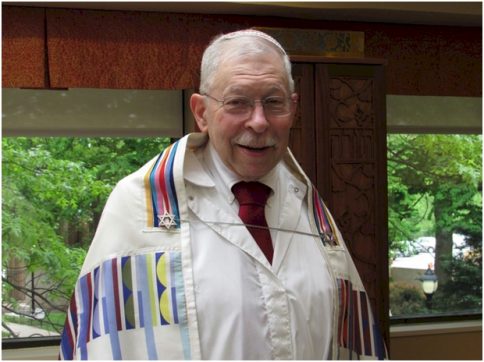Charles E. Smith Life Communities (CESLC)’s team of experts provides spiritual programs that address the changing needs of older adults. Throughout his years as a pastoral caregiver, Rabbi James Michaels “learned so much from our residents about their religious needs.” These experiences are now included in a new book, Dementia-friendly Worship: A Multifaith Handbook for Chaplains, Clergy and Faith Communities.
In this book, the rabbi contributed a chapter titled, “Prayer in a Jewish Long-Term Care Facility”. He shares insight on prayer with the aging community. One example is his experience with residents living in our memory care residence. “Residents in Cohen-Rosen, our memory care residence, do better without prayer books, so the persons who lead services there present the prayers and songs orally,” he said.
A few years ago, he was invited to join an organization called Clergy Against Alzheimer’s, an interfaith and diverse network of clergy committed to creating dementia-friendly faith communities. Through this group, he shared his experiences and learned how his colleagues helped others practice their faith. Clergy Against Alzheimer’s founder, Lynda Everman, compiled the book that explores how clergy and caregivers from different religious traditions support those with dementia in congregations and senior living communities. Rabbi Michaels contributed a chapter based on his CESLC experiences.
Throughout the years as a faith leader, Rabbi Michaels took on the responsibility of ensuring that residents could attend religious services that would meet their needs. He understood the necessity of prayer environments that were comfortable and welcoming. “When I began my tenure, all our services used standard prayer books. I saw that people with dementia and disabilities needed books which could not be purchased. As a result, we began to create our own prayer books to meet their needs,” he noted. This resulted in books with larger print for easier reading and lighter in weight.
“People in our skilled nursing residences have different needs from residents in independent living so we created different prayer books and led services to respond to these needs,” said Rabbi Michaels.
According to Rabbi Michaels, it is important that faith communities become more involved on learning more about seniors’ needs. “What is very clear is that clergy want the entire community to engage with people living with dementia,” he said. This book includes insights from leaders of diverse faiths and it is designed to raise awareness and make a difference.
According to Rabbi Michaels, being part of this community is a rewarding experience. “I was glad to contribute to this new book in order to share with others what I have learned.”

